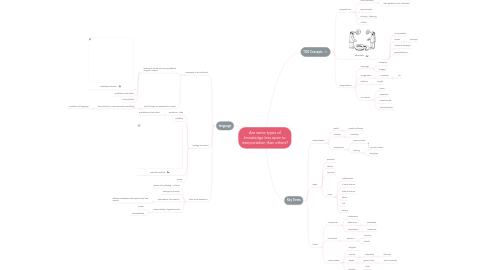
1. language
1.1. ambiguity of visual stimuli
1.1.1. looking at clouds and seeing different images / shapes
1.1.1.1. reliability of senses
1.1.1.2. qualitative information
1.1.1.3. interpretation
1.1.2. not all things are expressed in words
1.1.2.1. how closely can word describe something
1.1.2.1.1. limitations of language
1.2. biology lap report
1.2.1. evidence + data
1.2.1.1. quantitative information
1.2.2. reliability
1.2.3. scientific method
1.2.4. access
1.3. h&m racist sweatshirt
1.3.1. personal knowledge - cultural
1.3.2. ambiguity of words
1.3.3. implications: free speech
1.3.3.1. difference between hate speech and free speech
1.3.4. responsibility of global brands
1.3.4.1. power
1.3.4.2. accountability
2. TOK Concepts
2.1. perspectives
2.1.1. communication
2.1.1.1. social media
2.1.1.2. filter bubbles/ echo chambers
2.1.2. openminded
2.1.3. sharing + listening
2.1.4. culture
2.2. objectivity
2.2.1. is it possible?
2.2.2. biases
2.2.2.1. privilege
2.2.3. shared knowledge
2.2.4. generalisations
2.3. interpretation
2.3.1. language
2.3.1.1. metaphor
2.3.1.2. imagery
2.3.2. imagination
2.3.2.1. creativity
2.3.2.1.1. art
2.3.3. intuition
2.3.3.1. insight
2.3.4. innovation
2.3.4.1. vision
2.3.4.2. inspiration
2.3.4.3. inventiveness
2.3.4.4. resourcefulness
3. Key Terms
3.1. interpretation
3.1.1. belief
3.1.1.1. outside influence
3.1.2. memory
3.1.2.1. reliability
3.1.3. perspective
3.1.3.1. open minded
3.1.3.2. sharing
3.1.3.2.1. communication
3.1.3.2.2. language
3.2. types
3.2.1. personal
3.2.2. shared
3.2.3. common
3.2.4. AOKs
3.2.4.1. mathematics
3.2.4.2. human science
3.2.4.3. natural science
3.2.4.4. ethics
3.2.4.5. arts
3.2.4.6. history
3.3. others
3.3.1. comparison
3.3.1.1. relationship
3.3.1.2. differences
3.3.1.2.1. similarities
3.3.1.3. competition
3.3.1.3.1. enterprise
3.3.2. individuals
3.3.2.1. personal
3.3.2.1.1. memory
3.3.2.1.2. beliefs
3.3.3. communities
3.3.3.1. religious
3.3.3.2. country
3.3.3.2.1. nationality
3.3.3.3. digital
3.3.3.3.1. group chats
3.3.3.4. passion
3.3.3.4.1. clubs
3.3.3.4.2. hobbies
